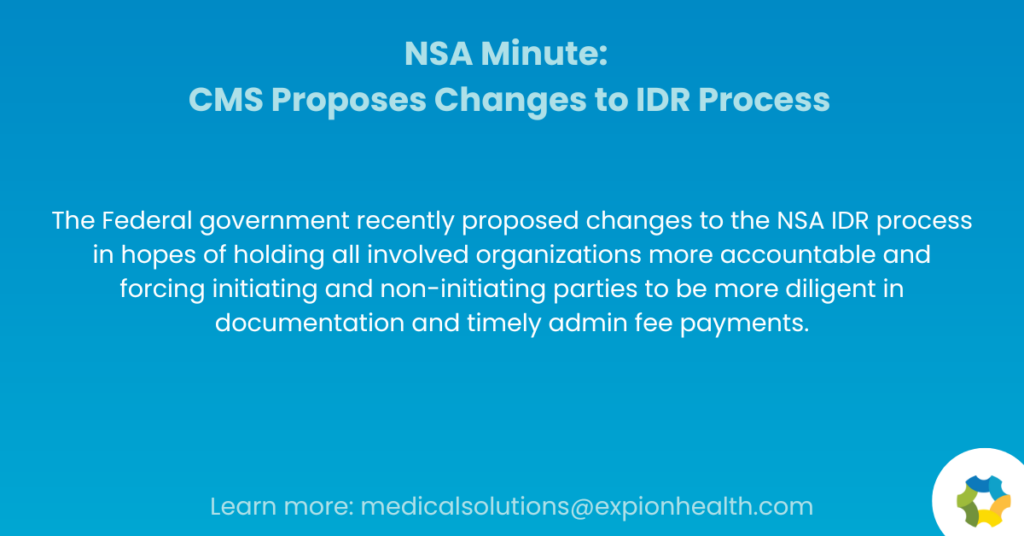
The Federal government recently proposed changes to the NSA IDR process in hopes of holding all involved organizations more accountable and forcing initiating and non-initiating parties to be more diligent in documentation and timely admin fee payments.
While the end goal may be to increase speed, efficiency, tracking and transparency, the immediate result is health plans are going to have to drastically change the way they are handling post-payment activities related to NSA cases that are appealed.
Further scrutiny on good faith efforts, stricter requirements for documentation and submissions, and shorter TATs allowed for admin fee payments will cause plans to spend even more administrative effort on each case, and change accounting policies for payment approvals.
Navigating these ever-changing compliances and administrative implications of the No Surprise Act can be daunting, but by enhancing your knowledge and reading the proposed changes can help you become prepared.
High Level Impact
- Open Negotiations and IDR will become more administratively complex with new submission requirements by both parties and new timeframes.
Communication changes both on the Remittance Advice and Notice of Denial will require system changes. - Administrative tracking of offers, due dates, qualified IDR items or services will incur greater scrutiny and more advanced training for the teams, as well as changes to client systems to fully encompass these pieces that may not be cost effective to engage/implement.
- Appeals and Grievance team members will require advanced training on extenuating circumstances, batching, and eligibility or jurisdiction.
- Finance will require new processes for faster turnaround on release of funds with two payment collection dates for the IDR process.
- New registration and maintenance by Compliance for the IDR process with advanced knowledge of state balance billing laws, plan types, and covered entities for applicability to the federal IDR process and registration, requiring more robust tracking efforts.
- More opportunities for providers to submit disputes and faster responses from the IDR entities on eligibility, requiring more robust tracking efforts.
- Failure to pay is an automatic default without consideration that an offer was submitted/received.
Detailed Proposed Changes
Open Negotiations
- Open Negotiation Notices must be submitted by the initiating party to both the non-initiating party (usually the payer) and all Federal Departments through a Federal Portal.
- Open Negotiations commences when the initiating party submits the Open Negotiation Notice
and a copy of the Remittance Advice (EOP/ERA/RA) or Notice of Denial (both criteria must be met now) and both must be submitted through the Federal IDR Portal. - New required elements to identify the item or service, reason for the denial of payment or initial payment amount, and whether the federal IDR process applies will be mandatory on the open negotiation notice.
- Responses must be made by the non-initiating party by the 15th business day.
- Offers made by both parties must be published in the IDR portal.
IDR Eligibility
- IDR entities must determine within 5 business days the jurisdiction or applicability of the federal IDR process.
- Eligibility determinations will be limited to only the jurisdiction and applicability but not payment determinations.
- The Departments would provide advance public notification of the date on which the Department eligibility review will begin and the reasons for invoking or ending the application of the eligibility review.
- Eligibility impacts the administrative fee to the non-initiating parties.
Administrative Fees
- The IDR entities will no longer collect and hold the non-refundable fees. This will be collected by the Departments.
- The initiating party would pay the non-refundable fee to the Departments within 2 business days of the IDR entity selection, but if not paid within two days, the dispute is closed and neither party owes the administrative fee.
- The non-initiating party (usually the payer) would pay the non-refundable fee to the Departments within 2 business days of receiving the notice of eligibility determination, but if not paid within two days, the offer is considered not received. The government will be establishing a debt collection process against non-initiating parties who do not submit fees in a timely manner.
- The administrative fee would be reduced when the highest offer made during the open negotiation period by either disputing party was less than a predetermined threshold.
- The administrative fee would be reduced for the non-initiating party (usually the payer) when the IDR entity determines that the dispute was not eligible for the federal IDR process.
- Initiating parties are held to a higher fee structure when submitting frivolous or ineligible disputes.
Extenuating Circumstances
- Expanded to include:
- Events that contribute to systemic delays in processing disputes under the federal IDR process (e.g., unforeseen volume of disputes or IDR portal system failures).
- Public notice of extension of time periods due to extenuating circumstances that contribute to system delays in processing disputes.
Batching
- Items and services furnished to a single patient on one or more consecutive dates of service and billed on the same claim form (a single patient encounter).
- Items and services billed under the same service code or comparable code under a different procedural code system (e.g. 97014 and G0283).
- Anesthesiology, radiology, pathology, and laboratory items and services billed under service codes belonging to the same Category I CPT code section, as specified by guidance by the department (e.g. 00100-01999, 70001-79999, 80001-89999).
- Batched items and services are limited to 25 qualified line items in a single dispute.
IDR Registry
- Payers subject to the Federal IDR process (almost all self-insured payers and most fully-insured payers where a state, such as Alaska, balance billing law does not supersede) must register with the government.
- Used by initiating parties to identify the payer and applicable parties involved in the Open Negotiation/IDR dispute.
- Used to distinguish between an issuer and a group health plan, which may use an issuer as a TPA.
EOB / Communication / Correspondence Changes
- Payers must now include on their Remittance Advice (EOP/ERA/RA) or Notice of Denial:
- Legal business of the plan (if any) or issuer.
- Legal business name of the plan sponsor (if applicable).
- IDR Registration Number (see section above).
- All applicable NSA-related RARCs and CARCs as effective from March 1, 2022.
Contact us to learn more about how Expion can assist in this ever-changing environment: [email protected].


